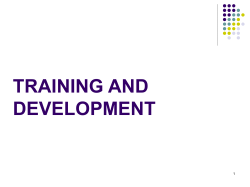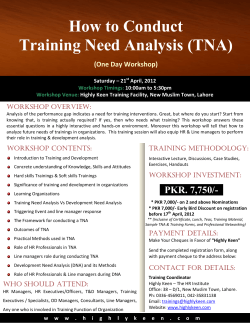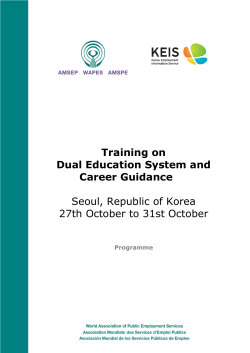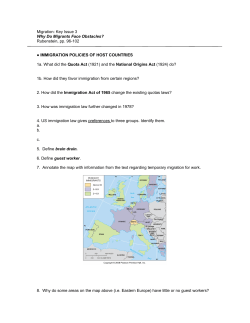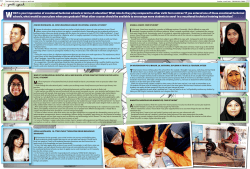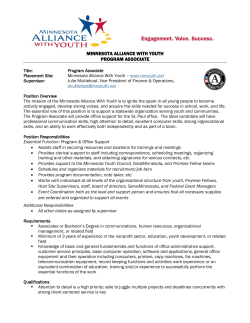
Low-Educated Vocational Training in France : Research and Practice Christophe PORTEFIN
Low-Educated Vocational Training in France : Research and Practice Christophe PORTEFIN As a PhD Student: DILTEC (EA 2288) Paris 3 Sorbonne Nouvelle PLIDAM (EA 4514) INALCO As a French Second Language/Key Competencies Teacher and Team Leader for adults in vocational training: christophe.portefin@laposte.net accentonic@laposte.net 10th LESLLA conference on Low-Educated Second Language and Literacy Acquisition 28 – 30 August 2014 - Nijmegen Summary Language Planning in France Language Training at Work Things you should know ʺBasic Key Skillsʺ Training at Work Fields and Inquiry Results Conclusion and Outlook 2 Language Planning in France A long tradition of Monolingualism 1539 : Ordinance de Villers-Cotterêts : French vs Latin (still active) French Revolution : Revolutionaries (Abby Grégoire and Barère) fought for French to become the national and compulsory language of instruction 1992 : ʺThe language of the Republic shall be Frenchʺ : French vs English (Constitutional Law) 1994 : ʺEstablished by the Constitution as the language of the French Republic, the French language is a key element in the personality and the heritage of France. French shall be the language of instruction, work, trade and exchanges and of the public services.ʺ (Use of the French Language Law) 2004 : « [strangers] should force themselves to speak French Language at home to help their children to use only French in everyday life » (Bénisti’s report about delinquency‘s prevention) 3 Language Planning in France French Second Language and Migrants 2006 : DILF, a compulsory low level (A1.1), a kind of Beginning Diploma of French 2007 : Compulsory Reception and Integration Contract (CAI) for Non EU People ʺLes personnes de nationalité étrangère et les Français non francophones, non titulaires d’un diplôme de l’enseignement secondaire français, peuvent se voir délivrer par le ministre chargé de l’éducation nationale un diplôme initial de langue française, qui leur est réservéʺ ʺL'étranger admis pour la première fois au séjour en France … et qui souhaite s'y maintenir durablement, prépare son intégration républicaine dans la société française. A cette fin, il conclut avec l'État un CAI, traduit dans une langue qu'il comprend, par lequel il s'oblige à suivre une formation civique et, lorsque le besoin en est établi, linguistiqueʺ (immigration, integration and asylum ‘s contain law) [2014 : a A2 or B1 Level to stay in France is questionned] 2007 : Assignments of the Minister of Immigration, Integration, National Identity and Codevelopment ʺAvec les ministres intéressés, il participe, auprès des ressortissants étrangers, à la politique d’apprentissage, de maîtrise et de diffusion de la langue française. Il est associé à la politique menée en faveur du rayonnement 4 de la francophonie.ʺ Language training at Work 1971 : Training at work : Companies have been forced to pay for vocational training 2004 : French‘s Life Long Learning : French Language is becoming a skill as any technical skill you can learn at work and being paid for this 2008 : European Pact on Immigration and Asylum Member States [are invited]…to promote language-learning and access to employment, essential factors for integrationʺ 2009 : Assignments of the Minister of Immigration, Integration, National Identity (nowadays a mix between Foreign Affairs and Inner Affairs) and Solidarity Development (nowadays International Development) « the Ministry has to link French Language to work and accomodation… » 2009-2010 : National Transprofessional Life Long Learning Agreement General Basic Knowledge and Skills should have be learned at School Ability to work with a Team / to work on Computers and Software Knowing English Language or Whatever else Foreign Language 2014 : National new agreement about Vocational training (in progress) Definition of basic skills at workplace Every vocational training should permit to be graduate/to pass a useful 5 qualification Things you should know about What a few words mean in France We do not speak about literacy in companies but « the basis, speak and write French », that means low skilled migrants We use Trainers for adults, Teachers only teach at school and are officially graduate for that French Foreign Language, French Second Language, French for Specific Purposes and so on are for university people When people talk about literacy, they think about illiteracy, that means French people For migrants who’ve never been at school, we speak about analphabetism All of this mean Basic skills, mainly for low educated people, especially 6 for people (sometimes highly skilled) working at low-skilled workplace in France ʺBasic Key Skillsʺ Training at Work our field of reserach Cleaning Services Command of Cleaning’s Key Competencies Food Processing Command of Fundamental Knowledge Building Industry Professional General Basic Training In these Basic Key Skills at Workplace Training Sessions, people are mixed together even they can read/write/speak French or not : the linked point is the company, not the level Main Points: • More and More, Language Training at Work is part of Basic Knowledge Training • More and More Sectors put in place these kinds of trainings • A lot of Migrants work in these sectors, mainly in under classified positions, part of them are considered as Invisible Workers •According to the ANLCI (Agence Nationale de Lutte contre l’Illettrisme) National Office fighting against illiteracy, between 8 and 30% of people do not command Basic Knowledge in any sectors •The ʺ Key Competences Framework In Professional Situation ʺ (designed for illiterate, used for everyone) has been7 created by this Office in 2009. The “Key Competences Framework In Professional Situation” (2009) SKILLS/KNOLEWDGE MOBILIZED GENERAL SKILLS/KNOWLEDGE APPLIED SKILLS/KNOWLEDGE A C H I V E M E N T I N T E R A C T I O N I N I T I A T I V E 4 general skills/knowledge : French Oral , Writing and Reading , Numeracy 6 applied skills/knowledge : ITC, Technology, SelfAttitude, Attitude at Workplace, Rules and Regulation, Cultural Awareness Two specifications have been generated: Cleaning Services and Food Processing 8 Where it comes from ? Key Competencies OECD Key Competencies for a Successful Life and a Well-Functioning Society 2003 Communication in the mother tongue / Communication in a foreign language Mathematical literacy and basic competencies in science and technology ICT skills / Learning to learn Interpersonal and civic competencies Entrepreneurship / Cultural awareness Essential Skills Canada First works in 1994 Reading / Document Use Numeracy / Writing / Oral Communication Working with Others Thinking Computer Use Continuous Learning 9 Inquiry Methodology Trainers : One By One Semi – Directed Interviews, Trainers Pedagogy Meetings, Pedagogic Tools’s Analysis, Qualitative Inquiry Learners : One By One Semi – Directed Interviews, Groups Interviews, Qualitative Inquiry Immersive Ethnographic Approach with a field/road book and android mobile to record audio files, take pictures and make movies Objectives What are the Representations of Learners, Trainers, Vocational Teaching’s Organisations, Companies Directors, Human Ressources, Staffs about these Basic Skills Trainings ? How Trainers put in place such Trainings and Manage them ? How the various Changings in Vocational Trainings in France affect the Training sessions? How do French Foreign Language Trainers adapt them to Basic Skills trainings ? Are these Trainings Really Effective ? References Making a Research about Teaching a language / Basic Skills in Companies Means Being at the Crossroads Linguistics Planning, Linguistics Competences, Basic Skills and Work, Working Sociology, Language and Work, Sociodidactics, Didactics... 10 A Few Results People in those trainings are mainly Plurilingual : for example, in 4 groups (30 people) from the same company in Cleaning services, according to what they say : 23 oral languages and 9 writing languages (some of them have never been to school, others till university) Afro-Asiatic (Arabic, Hassanyya), Austronesian (Malagasy), Dravidian (Tamul), Indo-European (English, Spanish, French, Portuguese, Serbian), Niger-Congo (Akan, Bambara, Comorian, Dioula, Fanti, Fulé (Peul), Ga, Sarakholé (Soninké), Twi, Wolof), Pidgin (Twi-French), my Language, our Language, Languages from Ghana People in those trainings work in a plurilingual and pluricultural environment : Most of them have been recruited by co-optation and work, more or less, in ethnic groups They speak French and more at work : between colleagues (L1s), with hierarchy (mainly French and Portuguese in Buildings), with clients (it depends) At work, French is the lingua franca for security, safeness, e-mail, care of customers,,, Why do they learn French ? ʺWe live in France, French is the language in France, for my own pleasure, to feel more confident..., “To Speak (to Colleagues, Public), Write, Read...” , “Because my Boss Wanted Me To Learn...” , “Because My Company Lost a Market”ʺ Personnal needs : to write and read administrative documents (taxes, post office…), school, bank, to gain respect Professionale needs : ʺI could work and understand colleagues and clients, I could apply for a job wherever I want, I could get professional promotion, I could read working papers, I could write by myself for asking for holydays…ʺ What do Trainers think about the “Key Competences Framework In Professional Situation” and its specifications ? « I have to do with these new tools » « Now, I do new things I have never thougt about it » « It such a huge tool I don’t understand anything » « It is not my job anymore, I am not trained for such a thing » « Where are the people we train in such an instrumentalist tool ? » « Actually, Trainers transmit what they want » ” 11 Conclusion and Outlook Professional French Language Growing Up French Language is more and more seen as a real competence Migrants have the right to learn French and companies begin to understand how essential it is “L’usage du français dans le monde …est porteur d’efficacité économique” La francophonie et la francophilie, moteurs de croissance durable, Attali’s report, 8/25/2014 Gap between illiterate and literate people “You saved my life” vs “I will get promotion” Gap between what do people want and need, what companies want and what do trainers really teach French Language or more than French ? Basic skills for what ? A language for what ? Objectives have to be clarified Professional and Personal Mixing or not mixing ? Training for who ? Salaried people or people ? Language linked to (Professional) Integration vs Work linked to Integration Sustainable Development ??? : Philanthropic Perspective vs Good Corporate Image and Socially Responsible Company The ʺKey Competences Framework In Professional Situation” and its specifications Good tools with bad purposes : the question of assessment of good technicians Being graduate without writing a word or spell your name ? “Qui est le dindon de la farce ? Who are the ones to suffer” Thanks a lot for your attention 12 Merci beaucoup Dank u wel
© Copyright 2025




